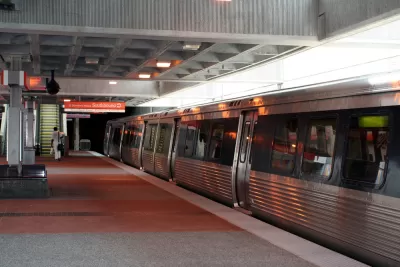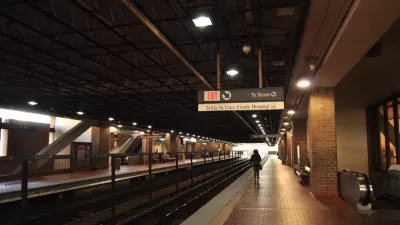A half-cent sales tax to fund an expansion of MARTA has been paired back to $2.5 billion and the city limits of Atlanta instead of $8 billion for the region, but Atlanta voters will have a chance to decide on the new tax despite its near demise.

Andria Simmons reports on the reborn efforts to fund transit in Atlanta, a few weeks after the Georgia State Legislature killed an $8 billion transit sales tax proposal.
Simmons provides a dispatch from a recent public appearance by Atlanta Mayor Kasim Reed, where the mayor "shared his thoughts…"on what an additional $2.5 billion of transit funding could mean for the city." This proposal has the necessary backing from the State Legislature, as of Simmons's writing. The final decision will come from the city's voters, who will consider a half-cent sales tax, to be added to the existing 1 percent sales tax that funds MARTA.
The article includes an interview between Mayor Reed and Atlanta Journal-Constitution staff writer J. Scott Trubey. One point that emerges immediately: the sales tax initiative only decides the funding mechanism for the MARTA expansion, while only creating what Mayor Reed describes as "a very nice runway to structure the project list and to have a very robust public discussion about what that should look like."
Angie Schmitt offers additional commentary on the back-from-the-dead trick pulled by the transit sales tax.
FULL STORY: Mayor Kasim Reed expands on Atlanta’s new transit plans

Maui's Vacation Rental Debate Turns Ugly
Verbal attacks, misinformation campaigns and fistfights plague a high-stakes debate to convert thousands of vacation rentals into long-term housing.

Planetizen Federal Action Tracker
A weekly monitor of how Trump’s orders and actions are impacting planners and planning in America.

In Urban Planning, AI Prompting Could be the New Design Thinking
Creativity has long been key to great urban design. What if we see AI as our new creative partner?

Milwaukee Launches Vision Zero Plan
Seven years after the city signed its Complete Streets Policy, the city is doubling down on its efforts to eliminate traffic deaths.

Portland Raises Parking Fees to Pay for Street Maintenance
The city is struggling to bridge a massive budget gap at the Bureau of Transportation, which largely depleted its reserves during the Civd-19 pandemic.

Spokane Mayor Introduces Housing Reforms Package
Mayor Lisa Brown’s proposals include deferring or waiving some development fees to encourage more affordable housing development.
Urban Design for Planners 1: Software Tools
This six-course series explores essential urban design concepts using open source software and equips planners with the tools they need to participate fully in the urban design process.
Planning for Universal Design
Learn the tools for implementing Universal Design in planning regulations.
Gallatin County Department of Planning & Community Development
Heyer Gruel & Associates PA
JM Goldson LLC
City of Camden Redevelopment Agency
City of Astoria
Transportation Research & Education Center (TREC) at Portland State University
Jefferson Parish Government
Camden Redevelopment Agency
City of Claremont




























